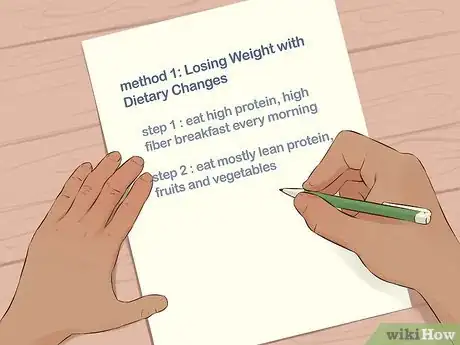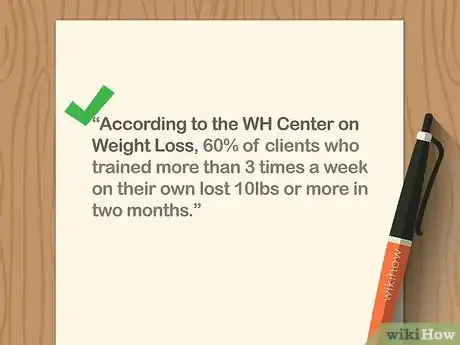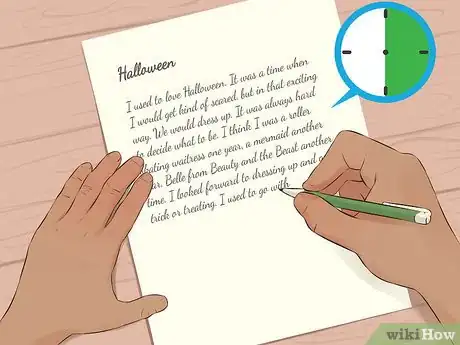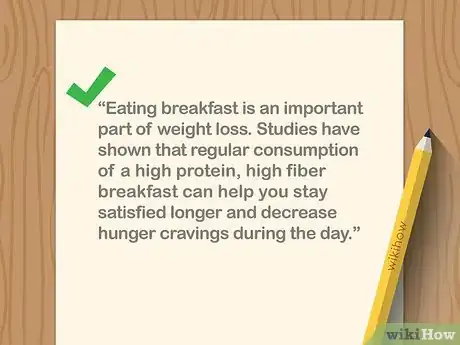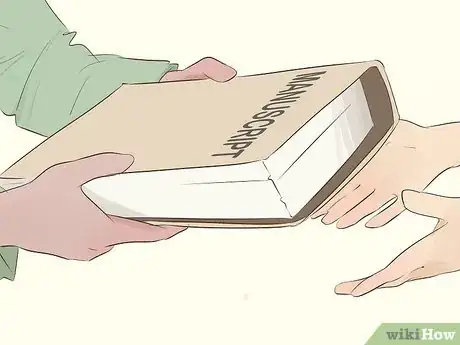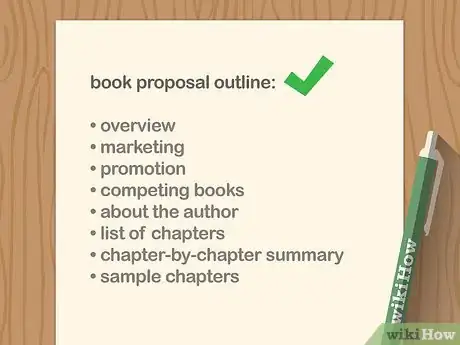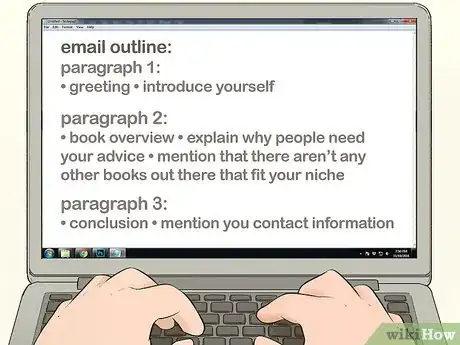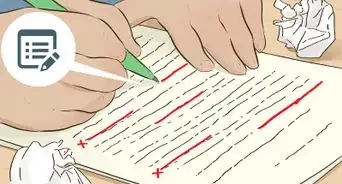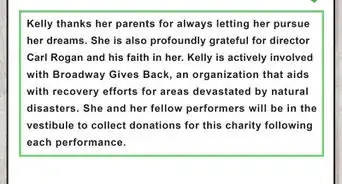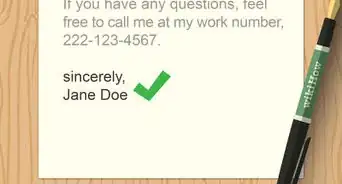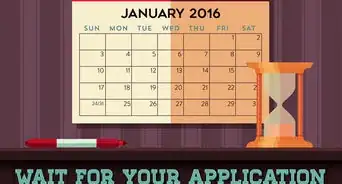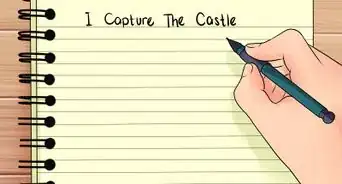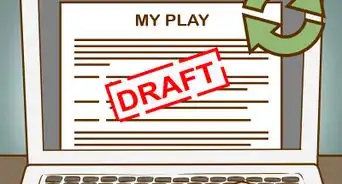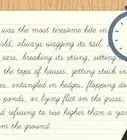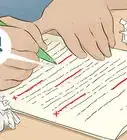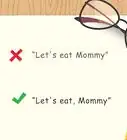This article was co-authored by Zachary Green. Zachary Green is an Entrepreneurship Coach, Author, and U.S. Marine Corp Veteran. With over 10 years of experience as an entrepreneur, he specializes in helping people transform their businesses, relationships, and lives. Zachary’s book, Warrior Entrepreneur, focuses on how warrior traits can help entrepreneurs, leaders, and others battle through adversity and accomplish their missions. Zachary was featured in Entrepreneur Magazine, on the front page of Yahoo.com, MSN.com, and in USA Today, along with numerous other local and national media outlets, and was named Entrepreneur of the Year by Governor John Kasich. Zachary was also selected by the Obama White House as one of 10 entrepreneurs to represent the United States at the Global Entrepreneur Summit. He was also featured in the US Playing Cards Frontline Leaders playing card series as one of 52 veteran entrepreneurs. Zachary earned a BA in Marketing and Sports Management from Bowling Green State University in Ohio. He won the Ohio Chamber of Commerce Entrepreneur of the Year in 2013, the SBA Ohio Small Business Exporter of the Year in 2016, a Spartan Distinguished Alumni Award in 2017, and a President’s E Award in 2019.
There are 13 references cited in this article, which can be found at the bottom of the page.
This article has been viewed 12,280 times.
If you’ve learned valuable life lessons, writing a self-help book can help you share your experience with others. To start, come up with a specific message and identify your target audience. Big projects like books can feel overwhelming, so break it into smaller chunks and take things 1 step at a time. Commit to daily writing goals, and aim for a relatable, encouraging tone. Once you've written most of the book, look for a publisher, start promoting yourself, and get excited about sharing your wisdom with the world!
Steps
Refining Your Message
-
1Focus on a particular aspect of a struggle you’ve faced. It’s hard to give direct, doable advice on topics that are too broad. Instead of taking a universal, one-size-fits-all approach, identify what made your situation unique. Think about specific details of the life experiences that inspired you to write a self-help book.[1]
- For instance, weight loss is super broad, and the right advice depends on factors like age, sex, activity level, and history of medical conditions. More focused topics could be losing weight after childbirth, eating healthy as a teen, managing weight while coping with a medical condition, or sticking to a specific diet.
-
2List the steps you took to address your problem. A good self-help book offers clear, actionable advice instead of vague platitudes. Outline the specific actions you took to solve your problem, and try to break these actions into the simplest steps possible.[2]
- Suppose you’re writing about supporting your partner while they were sick. Break up a big step like practicing self-care into sections on eating well, resting whenever possible, seeking help from loved ones, and joining a caregivers support group.
- If you’re listing habits or skills you developed to achieve something, break down the actions you took to hone those abilities. For instance, write about how you became more productive by making lists, setting priorities, and rewarding yourself for finishing tasks.
Advertisement -
3Talk to family and friends about your idea. Tell others about your idea and the life experiences that make you want to write a self-help book. Talking about your experiences can help you brainstorm, and getting feedback can help you figure out how to appeal to your audience.[3]
- Gauge reactions when you tell people about your ideas. If possible, try to reach out to people who are in the audience you want to reach. Their reactions can help you figure out which ideas will work best.
- For instance, suppose you want to write a book about the lessons you learned from being a single parent. Talking to other single parents can help you refine your ideas and narrow your book’s focus.
-
4Research your target audience’s specific needs. Now that you’ve come up with ideas for practical advice, learn more about who’s looking for advice on your topic. Try searching online for keywords related to your topic; look for related searches and “People also searched for” suggestions. Use this information to refine and prioritize your list of actionable advice.[4]
- Additionally, put yourself in your readers’ shoes. Think about their age, where they live, and what’s motivating them to read a self-help book. While they’re not credible research sources, Q&A sites like Quora can help you identify your target audience and their specific questions.[5]
- Say you’re writing about projecting confidence, and find that lots of people want advice about projecting confidence at their jobs. You can still include tips about confidence and personal relationships, but it’s wise to prioritize advice on projecting confidence at work.
-
5Look for reliable sources that support your advice. Readers feel like they can trust advice that’s backed with facts, so find out what the experts have said about your topic. If there’s evidence that contradicts your advice, tweak your tips, or at least mention the contradictory evidence in your text.[6]
- If you’re writing about self-love while being a caregiver, back up your advice by citing authorities such as the NIH (National Institutes of Health), Caregiver.org, and illness-specific organizations.
- Write, for instance, “Meeting your own needs is crucial to the caregiving process. According to the National Center on Caregiving, 1 in 4 long-term caregivers report that their physical health has deteriorated, and about 3 in 4 report signs of depression.”
Tip: When you look for information, include “.gov,” “.org,” and “.edu” in your search terms. Credible sources include recent scientific studies, government agencies, educational institutions, and reputable news bureaus.
-
6Find similar books on your topic. In addition to looking up facts and statistics, find out how other self-help authors have handled your topic. Search for keywords related to your subject matter plus “self-help book.” Run general searches and check online marketplaces, such as Amazon.[7]
- Read, or at least skim, existing self-help books related to your topic. Ask yourself what worked and what didn’t work, what improvements you could make, and how you could make your message unique.
- Learn more about the authors’ backgrounds, too. Find out what training, education, or life experiences qualifies them to cover the topic. Think about how your own experiences have given you a distinct perspective.
Writing Effective, Motivational Content
-
1Set aside time to free write every day. Do your best not to self-edit when you write. Focus on being a creator and worry about editing later. Stick to your commitments and dedicate time every day to write a little chunk of your book.[8]
- Try not to think about having to write hundreds of pages. Instead of seeing the book as a big overwhelming project, break it up into smaller pieces. Just focus on writing for 30 or 60 minutes at a time.
Tip: In addition to your scheduled writing sessions, keep a pad on you or use your phone or tablet to write when inspiration hits you.
-
2Emphasize that your readers have to power to achieve their goals. Focus on the “self” in “self-help;” your readers have to be the ones to help themselves. They have questions and doubts, and they want specific ways to solve their problems. Give your audience clear, concise tips, tricks, or exercises, and use encouraging language to motivate them to meet their goals.[9]
- Put yourself in your readers’ shoes. Think about where you were before you gained the experience that inspired you to write a self-help book. Ask yourself, “What questions did I have, and which answers did I need to hear?”
- To empower your readers, break down solutions into clear, achievable steps. Remember how thinking about writing 500 pages is overwhelming, but writing an hour a day is doable? Use the same “break-it-into-chunks” approach to explain your self-help solutions.
-
3Keep your tone conversational to connect with the reader. A good self-help book establishes a relationship with the reader. Write your book the way you speak, and use a friendly, positive tone. Even if you’re an expert in a discipline like psychology or medicine, don’t fill your pages with fancy, technical jargon.[10]
- Try to imagine that you’re giving advice to a friend or relative. That way, your writing will be more relatable and your readers will connect with you. Plus, a self-help book needs to motivate readers, and an upbeat, conversational tone is more encouraging than a dry, boring one.
- If you can’t avoid using a technical term, break it down into simple terms for your readers. For example, if you’re discussing how exercise affects mood, don’t talk about neurotransmitters as you would in a scientific journal.
-
4Back your claims by citing credible sources. Remember that readers love advice that feels authoritative and trustworthy. In addition to providing real life examples and personal anecdotes, support your advice with verifiable facts. For instance, mention statistics about the problem you’re addressing or studies that demonstrate your advice works.[11]
- Suppose you’re giving advice about cultivating mindfulness and you’ve included a section about limiting screen time. To lend your advice credibility, write, “As the American Medical Association points out, too much screen time can lower attention spans, interferes with sleep, and contributes to physical inactivity.”
-
5Hire a freelance copy editor to revise your manuscript. Tap your network and see if you know any copy editors. Alternatively, search online for the keywords “hire copy editor directory” to find a freelance editor.[12]
- A copy editor can help you refine your book’s structure and ensure your manuscript is free of errors.
- Costs depend on an editor’s experience level and the scope of the project. Basic proofreading might cost $500 to $1000 (U.S.), while substantive editing could run anywhere from $1000 to $4000.[13]
Publishing and Promoting Your Book
-
1Write a book proposal. Start with a few pages that present an overview of your book’s concept. Then include your bio; in a page or less, write about why you’re the right person to give this advice. Next, add a section detailing your book’s audience, and include information about why you appeal to that audience.[14]
- After that, discuss your professional and social networks and other ways you can market the book. Then provide your book’s specifications, including your manuscript’s word count and information about any charts, pictures, or other graphics.
- Finally, include outlines of your book chapters; each outline should be a few pages long. If you’ve never published a book before, it’s also wise to attach a sample chapter so publishers and agents can get a feel for your writing style.
-
2Send brief emails about your book to literary agents. Check the acknowledgments sections of books that are similar to yours. Authors typically thank their agents; take down agents’ names, search for them online, and track down their email addresses. Then send out concise emails that explain your book idea and sum up why it’ll sell.[15]
- Start with a greeting, like “I hope this finds you well!” Then introduce yourself in a sentence or 2. Describe your book’s main idea, explain why people need your advice, and mention that there aren’t any other books out there that fit your niche.
- Ask if they’d be willing to look at your book proposal, but don’t attach it to the introductory email. Then thank them for their time, and write that you look forward to hearing from them.
- Many publishers only work with literary agents, and most manuscripts sent to publishers by authors without an agent ultimately go unread.
-
3Negotiate a contract with a publisher. Once you’ve gotten an agent excited about your book, they’ll get in touch with potential publishers. A good agent will also come in handy when it’s time to negotiate the contract.[16]
- As far as basic rights go, the publisher reserves the exclusive right to publish and distribute your book. You reserve the rights to the book’s ideas and concepts. The contract will also specify your duties, such as delivering the manuscript by a set date.
- The contract lays out payment and royalties, too. In a typical royalty scheme, you’d receive around 10% for the first sales tier, and an increased percentage for each benchmark you meet.
- If you’re getting an advance, be sure to find out if you’d have to pay it back if the book doesn’t meet its sales goals.
-
4Be flexible about feedback you receive from a publisher. Your book is your baby, and it’s normal to feel protective of it. However, remember that the publisher and literary agent know what they’re doing. Try not to take it personally when they suggest revisions, and remember that they just want to make your book stronger.
- That said, if you feel like your book is losing its message, discuss the issue with the publisher or your literary agent. Explain your concerns and work with them to come up with a compromise.
-
5Consider self-publishing if you can’t find a traditional publisher. If publishers weren’t interested or you don’t want to go with the traditional publishing route, use a service such as Bookbaby, BookSurge, or Amazon Createspace. Self-publishing is fairly inexpensive, but it involves a little more work and has its own pitfalls.[17]
- You’ll need to design your own cover and handle all aspects of copy editing and layout. In addition to your publishing service’s fees, you’ll also need to purchase an ISBN for $125 (U.S.).
Keep in mind: Since it’s relatively easy, lots of people are self-publishing, and the market is saturated. However, with grit and perseverance, you can promote your book and get the buzz going.
-
6Set up social media accounts to promote your book. In addition to promoting your work on your personal social media profiles, create pages specifically for your book. Set up accounts well in advance, such as soon after you’ve signed a contract or set a release date. Invite your social and professional networks to like, follow, and share your pages.[18]
- Be sure to make quality daily posts on all of your social media channels. For instance, stream videos of yourself discussing the topics in your book, post quick self-help tips, and share photos with a countdown to your book’s release date.[19]
- Having an online presence and strong following can help you sell more copies of your book.
-
7Throw a book launch party. You worked hard, and you deserve a party! Even better, a launch party can generate interest in your book. If it’s in your budget or you can find a sponsoring business, have the party in a public, visible place, such as a bookstore or restaurant.[20]
- If you partner with a bookstore or other retailer, see if they can offer a small discount to people who attend the launch party. Discounts, raffles, and giveaways are great ways to get people in the door.
- Post the event on social media, invite your friends and family, and encourage them to spread the word. In addition, send press releases to local newspapers and other media outlets.
Tip: You could also choose a venue that’s related to your book’s theme. For instance, if your book is about getting more active, contact a gym, yoga studio, or sporting goods store and ask if they’d be willing to collaborate on the event.
-
8Encourage your friends and family to buy your book on a set date. Ask everyone in your social network to buy your book online within the same time window. That could make your book appear in more search results or send it to the top of the daily charts.[21]
- The exposure could lend momentum to your book, and you might see your sales spike further.
Expert Q&A
-
QuestionHow do you plan to write a self-help book?
 Pete CanalichioPete Canalichio is a Brand Strategist, Licensing Expert, and Founder of BrandAlive. With nearly 30 years of experience at companies such as Coca-Cola and Newell Brands, he specializes in helping brands find the most authentic parts of their story to build a brand strategy. Pete holds an MBA from the University of North Carolina at Chapel Hill and a BS in Physics from the United States Naval Academy. In 2006, he won an MVP Award from Newell Brands for his contributions to their Global Licensing department. He’s also penned the award-winning book, Expand, Grow, Thrive.
Pete CanalichioPete Canalichio is a Brand Strategist, Licensing Expert, and Founder of BrandAlive. With nearly 30 years of experience at companies such as Coca-Cola and Newell Brands, he specializes in helping brands find the most authentic parts of their story to build a brand strategy. Pete holds an MBA from the University of North Carolina at Chapel Hill and a BS in Physics from the United States Naval Academy. In 2006, he won an MVP Award from Newell Brands for his contributions to their Global Licensing department. He’s also penned the award-winning book, Expand, Grow, Thrive.
Brand Strategist & Licensing Expert Think really hard about what's involved in creating the book. What's the importance of the book? Why do you think this book will contribute and make a difference to the subject? Who is your target audience, and how are you going to reach them? How would you market to this audience? It's really important to look at the purpose, vision, and mission of your book and then be able to connect with individuals who are challenged with the same subject.
Think really hard about what's involved in creating the book. What's the importance of the book? Why do you think this book will contribute and make a difference to the subject? Who is your target audience, and how are you going to reach them? How would you market to this audience? It's really important to look at the purpose, vision, and mission of your book and then be able to connect with individuals who are challenged with the same subject.
Expert Interview
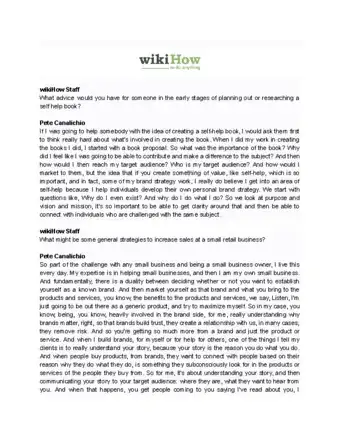
Thanks for reading our article! If you'd like to learn more about being an entrepreneur, check out our in-depth interview with Pete Canalichio.
References
- ↑ https://nybookeditors.com/2017/06/guide-writing-self-help
- ↑ https://nybookeditors.com/2017/06/guide-writing-self-help/
- ↑ https://www.entrepreneur.com/article/311445
- ↑ https://nonfictionauthorsassociation.com/8-tips-for-a-winning-self-help-book-title-by-melanie-votaw/
- ↑ https://nybookeditors.com/2017/06/guide-writing-self-help/
- ↑ https://nybookeditors.com/2017/06/guide-writing-self-help/
- ↑ https://www.writing.ie/resources/how-to-write-a-self-help-book-that-sells-by-donna-kennedy/
- ↑ https://www.forbes.com/sites/nickmorgan/2013/10/31/thinking-of-writing-a-book-heres-what-you-need-to-know-4/#18d6c05f4829
- ↑ https://www.writing.ie/resources/how-to-write-a-self-help-book-that-sells-by-donna-kennedy/
- ↑ https://www.psychologytoday.com/us/blog/fulfillment-any-age/201205/five-things-you-need-know-about-self-help-books
- ↑ https://www.psychologytoday.com/us/blog/fulfillment-any-age/201205/five-things-you-need-know-about-self-help-books
- ↑ https://www.cnet.com/news/self-publishing-a-book-25-things-you-need-to-know/
- ↑ https://www.the-efa.org/rates/
- ↑ https://www.forbes.com/sites/nickmorgan/2013/10/24/thinking-of-writing-a-book-heres-what-you-need-to-know-2/#4b615ea51d46
- ↑ https://www.forbes.com/sites/nickmorgan/2013/10/29/thinking-of-writing-a-book-heres-what-you-need-to-know-3/#6fa1588d15c1
- ↑ https://www.forbes.com/sites/nickmorgan/2013/10/29/thinking-of-writing-a-book-heres-what-you-need-to-know-3/#6fa1588d15c1
- ↑ https://www.cnet.com/news/self-publishing-a-book-25-things-you-need-to-know/
- ↑ https://www.entrepreneur.com/article/311445
- ↑ https://www.entrepreneur.com/article/254043
- ↑ https://www.entrepreneur.com/article/311445
- ↑ https://www.forbes.com/sites/nickmorgan/2013/11/05/how-to-market-and-sell-your-book-in-five-steps/#5b1aae746d58
- ↑ https://www.forbes.com/sites/nickmorgan/2013/10/31/thinking-of-writing-a-book-heres-what-you-need-to-know-4/#18d6c05f4829

